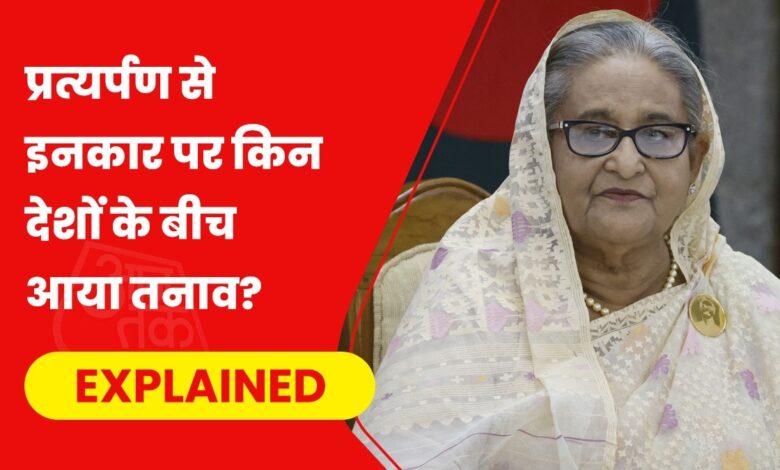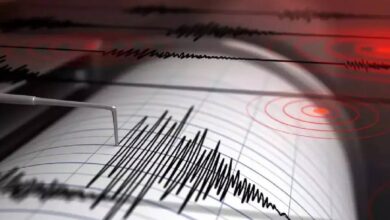sheikh hasina extradition – Bangladesh wants the return of Sheikh Hasina, will India agree, on what basis can it refuse? – bangladesh ex pm sheikh hasina extradition demand by dhaka to india mdj

Tension is increasing in the relations between Bangladesh and India. In early August, the then PM Sheikh Hasina was overthrown amid violent protests. The situation became so bad that he had to secretly come to India. Now there is an interim government, which is more focused on how to recall Hasina than improving the situation in the country. For this, it is also continuously putting diplomatic pressure on the Indian government. The Dhaka-based tribunal even sought help from Interpol in his arrest. Know what options are left for India in the meantime.
what’s new now
Dr Tauheed Hussain, advisor to the Foreign Ministry in the Yunus government, put forward this demand on 23 December. While sending the diplomatic note, he said that the government wants Hasina’s extradition for the legal process. In fact, the current government alleges that during Hasina’s tenure, there was violence against many people and even protesters were harmed. Genocide is also included in more than 60 complaints against Hasina and her people.
Reportedly, she wants the arrest of Hasina and many Awami League leaders for this investigation. She is continuously requesting this from India. The diplomatic message sent recently was also about this. But this was not completely formal, rather it was a note verbal, which was not signed by any particular officer. That means, from Dhaka’s side, safe ways are being found.
What other methods has Dhaka adopted for Hasina’s return?
Amid serious allegations like genocide, Dhaka is doing many things to detain Hasina. The International Criminal Tribunal located there has issued an arrest warrant against Hasina and her close associates and has sought help from Interpol in this. Yunus government also wanted the intervention of the United Nations in this. Here he is continuously putting pressure on India. It’s been five months since this happened.
What options does India have amid increasing pressure?
India always talked about good relations with its neighbours. Bangladesh is also involved in this. India continuously helped him under the policy of Neighbor First but at present the issue is different. The attitude of the interim government of Dhaka was visible against New Delhi from the very beginning. Now he wants to drag India into domestic matters. Till now the country has not made any strong comment on this, but if the matter of extradition takes legal form, and there is talk of investigation in criminal cases, then Delhi will have few options.
Where is the former PM of Dhaka at present?
At present he is kept under tight security in a safe house on the outskirts of Delhi. No one is allowed to meet him. According to the report of German media DW, his daughter Saima Wajed, who works as a director in WHO, was also unable to meet him.
Which agreement regarding extradition
There is an extradition treaty between the two countries since 2013. According to the extradition treaty, both the countries have to hand over criminals to each other. There is a provision in this that if a person has committed a crime which has a provision of punishment of at least one year, then he will be extradited. It is written in the treaty that if a person has committed any crime of political nature then his extradition can also be refused. However, extradition of a person involved in crimes like murder, genocide and kidnapping cannot be refused.
When can the host country refuse?
A country may also refuse extradition if the crime is political, or the accused can convince that it is being done due to political hatred, or his life may be in danger if he returns to a particular country.
There is also a clause in the treaty that either of the two parties can end the treaty by giving notice. But this is an extreme step, which if taken by any country can weaken diplomatic relations. At present India is not giving any direct or strong reaction in this matter. Anyway, these cases take a lot of time because the technical and legal process happens slowly.
There may be an advantage in making the process last longer.
Hasina herself can challenge the extradition in court if she feels that the investigation will not be transparent, or she may face any danger during it. The withdrawal process is lengthy and fraught with legal scrutiny. In such a situation, if the person whom the other country wants back also files a case against it, then the matter may drag on for a longer time. Meanwhile, many political changes take place, which will also take place in Dhaka. It is also possible that Hasina herself may return there safely.
Distance in these countries for refusing extradition
– Former NSA employee Edward Snowden took refuge in Russia after leaking many intelligence documents. Russia had refused to return them, which increased the distance between the two.
– During the Bhopal gas tragedy of 1984, a criminal case was registered in the country against Union Carbide lead Warren Anderson but the US had stopped the extradition of the accused.
– After Tibetan religious leader Dalai Lama gave refuge in India, relations with China started deteriorating.
– After the overthrow of Afghan President Ashraf Ghani, some leaders took refuge in Turkey. Turkey clearly refused his return.




